What are the rules about competing at the Olympics with COVID?
Noah Lyles said he has COVID after winning bronze in the 200 meters. Should he have been allowed to run?
Noah Lyles said he has COVID after winning bronze in the 200 meters. Should he have been allowed to run?
In Paris on Aug. 7, after 200-meter world champion and American record-holder Noah Lyles finished second in his semifinal heat of the 200 meters, he did not stop to talk to the media in the mixed zone.
That was unusual for Lyles—he isn’t one to pass up the opportunity to speak. Instead, he was reported to be seeking medical treatment.
And one day later, after the final of the 200 meters, the world knows why. Lyles tested positive for COVID on Tuesday morning, he told trackside reporter Lewis Johnson of NBC after the final. Letsile Tebogo of Botswana won in 19.46, Kenny Bednarek of the United States was second in 19.62, and Lyles was third in 19.70.
Lyles left the track in a wheelchair, but he went through the mixed zone, the subterranean room at Stade de France where athletes talk to the media, on foot. He was masked as he answered questions from reporters.
He said he started to feel poorly at about 5 a.m. on August 6, with a fever, chills and a sore throat. A test revealed COVID. But Lyles said it was “never a thought” not to compete and he said by the 200 meters on Thursday, he was at about 90 to 95 percent health. Lyles is taking Paxlovid.
He kept his diagnosis very private, so as not to give an advantage to his competitors.
All this begs the question: What are the rules about competing at the Olympics with COVID?
Short answer: It’s up to the athlete.
"Scientific American" reported that the Paris Games are treating COVID like any other respiratory illness. There are single rooms in the Olympic Village for athletes who have COVID. And athletes who are sick are encouraged to wear masks, wash their hands frequently, and avoid contact with others.
Lani Pallister, an Australian swimmer who contracted COVID, withdrew from the 1500 meters in order to save energy for a later race. An unnamed Australian water polo player was isolated after getting sick, but Anna Meares, the head of the Australian Olympic delegation, said in an article on the Olympic news service, “I need to emphasize that we are treating COVID no differently to other bugs like the flu. This is not Tokyo.”
Athletes who have talked to reporters in the track’s mixed zone said illnesses was circulating through the athletes at the Olympic Village. Jakob Ingebrigtsen spoke to media after the 1500 meters wearing a mask, thought to be a precaution. Grant Fisher, who won bronze in the 10,000 meters, was not staying in the village and in fact went back to altitude in St. Moritz, Switzerland, before the start of the 5,000 meters.
It has not yet been determined whether Lyles, who won the 100 meters, will compete on the 4 x 100-meter relay team for the U.S. “I’m going to be honest and transparent with them and let them make the decision,” Lyles said. “I believe that no matter what happens, this 4 x 100 team can handle anything.”
USA Track & Field did not immediately respond to questions from "Runner’s World."
As previously reported in "Runner’s World," rushing back to running and exercise after you’ve had COVID isn’t always the best idea.



